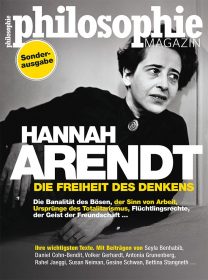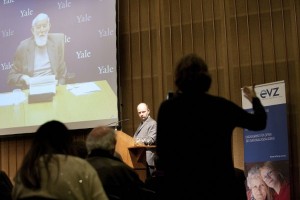 “Something happened there to which we cannot reconcile ourselves. None of us ever can,” said Hannah Arendt with regard to Auschwitz and its repercussions during a now legendary TV interview with Günter Gaus. A two-minute excerpt from that encounter serves today in our permanent exhibition as introduction to a film installation concerning the Auschwitz Trial (cf. this blog entry about the reopening of that part of the exhibition in summer 2013).
“Something happened there to which we cannot reconcile ourselves. None of us ever can,” said Hannah Arendt with regard to Auschwitz and its repercussions during a now legendary TV interview with Günter Gaus. A two-minute excerpt from that encounter serves today in our permanent exhibition as introduction to a film installation concerning the Auschwitz Trial (cf. this blog entry about the reopening of that part of the exhibition in summer 2013).
In our exhibition of the work of Fred Stein in 2013/14 we presented photographs inter alia of the political theorist Arendt herself, as you can read in our blog and on the exhibition website.
Hannah Arendt is a major influence also on contemporary artists: Alex Martinis Roe, in the work she produced for our art vending machine, “A Letter to Deutsche Post,” demanded a re-issue of the postage stamps bearing Arendt’s portrait (cf. our interview with the artist in this blog). Also, a symposium held at our museum last December drew on the work of Hannah Arendt as a springboard for discussion of the current significance of pluralism in theory and practice (cf. the topics addressed there, as listed in our events calendar).
Philosophie Magazin has just devoted a special issue to this exceptional thinker. Titled Hannah Arendt. Die Freiheit des Denkens [Hannah Arendt. The Freedom of Thought], on the newsstands as of 16 June. → continue reading
We’d like to let you know about a very special documentary screening at Kino Babylon Mitte, Berlin, on 25 August: L’chaim! To life!
The film portraits Chaim Lubelski, an orthodox Jew and successful businessman in New York who jet-sets to St. Tropez. When his mother, a Holocaust survivor, is in need of care, he returns to Antwerp to look after her.
Trailer
In his feature-film debut, producer and director Elkan Spiller presents his cousin, Chaim, as a rebellious, charming maverick – a man who tries to relieve his parents’ pain with courage, humor and love. → continue reading
How our culture of remembrance is changing in view of a disappearing generation of contemporary witnesses to World War II was the subject of a conference called “Preserving Survivors´ Memories – Digital Testimony Collections about Nazi Persecution” at the Haus der Kulturen der Welt in Berlin from 20 to 22 November 2012.

Geoffrey Hartman per video connection © Birgit Meißner, EVZ
The conference was kicked off by Yale University comparative literature professor (emeritus) and Holocaust studies pioneer, Geoffrey Hartman. Born in Frankfurt in 1929, Hartman emigrated to England in 1939 as part of the refugee children’s movement. Together with his wife Renée, a survivor of the Bergen-Belsen concentration camp, he became involved in the founding of the Fortunoff Archive, which has recorded video interviews with Holocaust survivors since the 1970s. He views these video interviews as constituting a genre of their own, whose greatest significance comes from allowing survivors to speak for themselves. → continue reading
 “Something happened there to which we cannot reconcile ourselves. None of us ever can,” said Hannah Arendt with regard to Auschwitz and its repercussions during a now legendary TV interview with Günter Gaus. A two-minute excerpt from that encounter serves today in our permanent exhibition as introduction to a film installation concerning the Auschwitz Trial (cf. this blog entry about the reopening of that part of the exhibition in summer 2013).
“Something happened there to which we cannot reconcile ourselves. None of us ever can,” said Hannah Arendt with regard to Auschwitz and its repercussions during a now legendary TV interview with Günter Gaus. A two-minute excerpt from that encounter serves today in our permanent exhibition as introduction to a film installation concerning the Auschwitz Trial (cf. this blog entry about the reopening of that part of the exhibition in summer 2013).